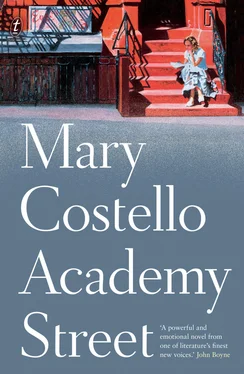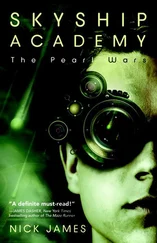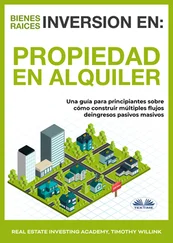Mary Costello - Academy Street
Здесь есть возможность читать онлайн «Mary Costello - Academy Street» весь текст электронной книги совершенно бесплатно (целиком полную версию без сокращений). В некоторых случаях можно слушать аудио, скачать через торрент в формате fb2 и присутствует краткое содержание. Год выпуска: 2014, Издательство: Text Publishing Company, Жанр: Современная проза, на английском языке. Описание произведения, (предисловие) а так же отзывы посетителей доступны на портале библиотеки ЛибКат.
- Название:Academy Street
- Автор:
- Издательство:Text Publishing Company
- Жанр:
- Год:2014
- ISBN:нет данных
- Рейтинг книги:3 / 5. Голосов: 1
-
Избранное:Добавить в избранное
- Отзывы:
-
Ваша оценка:
- 60
- 1
- 2
- 3
- 4
- 5
Academy Street: краткое содержание, описание и аннотация
Предлагаем к чтению аннотацию, описание, краткое содержание или предисловие (зависит от того, что написал сам автор книги «Academy Street»). Если вы не нашли необходимую информацию о книге — напишите в комментариях, мы постараемся отыскать её.
J.M. Coetzee
Academy Street This is an intimate story about unexpected gifts and unbearable losses, and the perpetual ache for belonging. It is exquisitely written and profoundly moving.
Academy Street — читать онлайн бесплатно полную книгу (весь текст) целиком
Ниже представлен текст книги, разбитый по страницам. Система сохранения места последней прочитанной страницы, позволяет с удобством читать онлайн бесплатно книгу «Academy Street», без необходимости каждый раз заново искать на чём Вы остановились. Поставьте закладку, и сможете в любой момент перейти на страницу, на которой закончили чтение.
Интервал:
Закладка:
Out of the blue, a letter arrives from their mother’s sister Molly, in America, inviting Claire to come out. At first Tess thinks it is a holiday invitation. But the word, and the image of the place, America , evoke a feeling of exile and eternal loneliness. In the weeks following, as the practicalities are worked out — Molly secures a job for Claire at the Bell Telephone Company where she herself works — and the departure date is set, a feeling of dread falls on Tess.
She does not go with Denis and Oliver and their father to see Claire off at Cobh. She does not want to possess a memory of that parting. The feeling that everything good in her life is now vanishing is too much to bear. She sits in the quiet of the house all morning. She takes down notepaper and envelopes and writes to the only two hospitals in Dublin whose names she has ever heard of. In neat handwriting she states her eagerness to train as a nurse. She gives details of her education and asserts her suitability for the profession. My late mother was a nurse and I would like to continue the family tradition in this vocation .
A month before her twentieth birthday she receives a letter from the Mater Hospital offering her a place as a trainee nurse, pending an interview, character references and the payment of a fee. On a September morning she boards the train at Woodlawn Station and is ferried across the country, into the unknown. Somewhere in the midlands the sky darkens and the train slows to a halt in the middle of nowhere. There is an eerie silence in the carriage. Suddenly a fork of lightning cuts the sky in two. With her heart crossways she watches the lighted sky as each angry flash erupts and dazzles and disappears.
She resides in the Nurses’ Home among other girls from the country. Every morning she dons her starched uniform and white shoes and goes on duty. In the evenings she attends classes. She is eager, and learns quickly, in both theory and practice. At night she sits on her bed poring over her textbooks, occasionally startled by a siren in the streets outside. She writes to her father every fortnight and to Claire in New York almost every week. On her days off she walks along O’Connell Street, gazing in shop windows, occasionally entering Clerys to buy nylons or a cardigan and once, during their winter sale, a herringbone tweed coat with a fur collar and cuffs. She goes to the cinema with a girl from Cork, but mostly avoids social gatherings and nights out. The shyness she feels among others, and the terrible need to fit in, cause her such anxiety that when the evening arrives the prospect of going among people renders her immobile, disabled, sometimes physically sick. Whenever possible, she opts for night duty, the low lights and the hush of the ward offering the closest thing to solitude available in a working life. When she meets the gaze of an attractive young doctor at a patient’s bedside she blushes and averts her eyes, longing to respond with a flirtatious smile or remark, like the other girls do. She joins the library at Phibsborough, borrows two novels each week, goes for walks along the city streets and down by the river. One day, on Townsend Street, she stands at the entrance to a new building that houses a swimming pool and reads a notice for swimming classes. She has an image of herself cutting a swathe, a solitary furrow, through still blue water. During the two years of her training, and afterwards as a ward nurse, she is warm and polite with her colleagues, but fails to form one lasting friendship.
Occasionally, on a Saturday when she is off duty, she meets up with Maeve, in from her digs in Blackrock, and the two sisters stroll around the city. Once, in February, as they walk along the footpath outside the GPO, a street photographer appears before them and takes their picture. They are walking arm in arm, both in fashionable tweed coats and pointed black shoes. Later when Tess looks at herself in the photograph she sees for the first time what others must see — a young woman with a nice enough face and smiling eyes — something that does not accord with the image of herself she carries within. She places the photograph in an envelope and writes a note and addresses it to Claire, care of her aunt Molly’s, 731 West 183rd Street, New York. She looks at the address for a long time. 183rd Street. She says it aloud. She sees Claire there, sitting in a chair. She feels something, a streaming across, at that moment.
With each trip back to Easterfield, changes accrue. Captain is gone. He slunk from the shadows on his belly one day and lay under the wheel of the car as it entered the yard. Often, she replays this image in her mind and remembers his small black eyes gazing into hers on those nights when she took him up to her room. Mike Connolly returned to his own people in Connemara, too old and ill now — and no longer needed — to endure the labour or fulfil the duties he had performed at Easterfield for nearly thirty-five years.
Oliver, more than anyone, has changed. He is tall and handsome with a shock of blond hair and mischievous blue eyes — so different from Denis’s dark brooding looks. You will charm the birds in the trees, she tells him. And your beauty will cast a spell, she thinks. He has learnt to drive. He takes the car out at night to pubs and dances, indicating a certain wildness of character that is not ordinarily tolerated in Easterfield but to which, somehow, her father turns a blind eye. Tess slips into her old ways with her father when she is back — an attitude of reverence, obedient service, meekness. She has seen him age. One night in the kitchen a memory surfaces. It is, she thinks, her first memory of him. She is no more than two or three years old and she is in his arms, being lifted high onto the back of a horse. She is terrified and starts to cry and he lifts her down, then holds her against his warm face.
A peaceful lull falls on the kitchen and she looks at him. ‘Will I cut your hair?’ she asks. He turns his head towards her, and she waits to be denounced. He looks at her, baffled, stunned, as if he has suddenly found himself somewhere else. His chin begins to quiver, and he looks down. She is flooded with tender feelings for him. She sees for the first time all he has endured. Holding things together, holding himself together, poised, always, to defend against a new catastrophe. She gets up and lays a towel on his shoulders and begins to cut his hair. Neither of them says a word. She is moved by his silent acquiescence. Gently she takes each strand and cuts, the sound of the scissors in the air between them, the hair falling to the floor. And his sorrow, for all that is lost, lying silent within him.
PART TWO
5
LATE IN THE summer of ’62 Tess flew on a TWA flight from Shannon Airport to New York. Before she left that morning her father handed her a £50 note, and then shook her hand formally, awkwardly. Denis and Maeve, and Evelyn in a hat and pregnant again, sat into the car. As they drove away Tess looked back at the house, her eyes lingering on the upstairs windows, then out at the land. Halfway down the avenue, Denis stopped the car to get something from the boot. She turned her head to the lone ash tree among the beeches and saw, for the first time, a band of barbed wire embedded in the trunk, the flesh forced to grow over the spikes in pained little folds and swellings. Denis sat in and they drove on. How had she missed this before? Who had done it? This was Lohan land, a Lohan tree. So, a Lohan hand.
At the airport the summer wind gusted and blew Evelyn’s hat off and she ran after it, and they all laughed. This will be my memory, she thought. As they parted they threw holy water on her and she blessed herself. Denis looked down, his long arms hanging, and she remembered the injured ash again.
Читать дальшеИнтервал:
Закладка:
Похожие книги на «Academy Street»
Представляем Вашему вниманию похожие книги на «Academy Street» списком для выбора. Мы отобрали схожую по названию и смыслу литературу в надежде предоставить читателям больше вариантов отыскать новые, интересные, ещё непрочитанные произведения.
Обсуждение, отзывы о книге «Academy Street» и просто собственные мнения читателей. Оставьте ваши комментарии, напишите, что Вы думаете о произведении, его смысле или главных героях. Укажите что конкретно понравилось, а что нет, и почему Вы так считаете.












